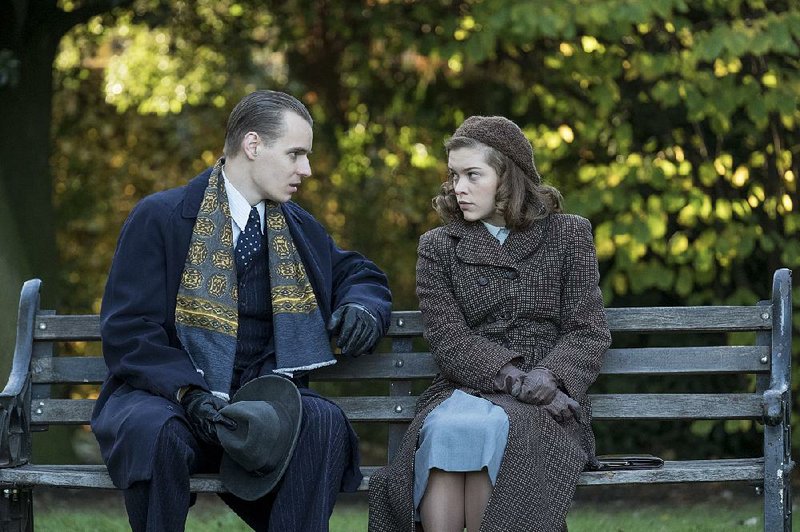A mildly engaging British spy story that squanders its most potentially elevating ingredient of Dame Judi Dench, Red Joan isn't nearly what it should be. It's an invented story that's less interesting than its ostensible real-life inspiration.
In September 1999, The Times of London ran a front-page story exposing Melita Norwood, a British civil servant who spied for the Soviet Union for 40 years, from her recruitment in 1937 until 1977. Norwood, who was 87 at the time, had been passing atomic secrets to the Soviets and was regarded by her handlers as perhaps their most important British asset, more so than the infamous Cambridge Five. It's been estimated that the secrets she passed on shortened the Soviet development of an atomic weapon by as much as five years.
Red Joan
82 Cast: Judi Dench, Sophie Cookson, Stephen Campbell Moore, Tom Hughes, Tereza Srbova, Ben Miles
Director: Trevor Nunn
Rating: R, for brief sexuality/nudity
Running time: 1 hour, 41 minutes
Norwood was never prosecuted for her actions, and remained an unrepentant Communist until the day she died in 2005, at the age of 93. She had joined the party in 1936 and never made a secret of her politics; for years she was locally famous for pushing copies of the Communist Party newspaper on her bemused neighbors. When she was exposed, she read a statement to the press on her front door: "I did not want money. It was not that side I was interested in. I wanted Russia to be on equal footing with the west."
An interesting psychological drama could be made from this material. Unfortunately Red Joan takes what one imagines the filmmakers thought was a safer route -- in the film the Norwood character, renamed Joan Stanley (Dench, and as a young woman, Sophie Cookson) comes off as a studious and brilliant political naif who is caught up in a spy ring largely because of her romantic affiliation with dashing Leo (Tom Hughes), a German Jew she encounters while at school in Cambridge. Joan meets Leo after his sister Sonya (Czech actress Tereza Srbova), looking to avoid the house mother, comes scratching at her window after a night on the prowl.
We learn all this in flashback as elderly Joan is interrogated by MI5; the movie opens with a perhaps irresistible but factually incorrect image of her tidy flat being raided by the police and Joan's arrest for treason. While she denies everything at first, she unspools the story in a way that feels entirely predictable. She's bedazzled by Leo at first, and though Stalin gives her pause (all the talk of purges and pogroms is so much fake news, Leo explains) the real villain is that guy Hitler. She doesn't lift an eyebrow at Leo's rhetoric, his impatience with silly novels and his yearning for "a chance to rebuild civilization in a totally new way."
Leo goes back to the continent to commit acts of derring-do, and young Joan becomes the indispensable assistant to Max Davis (Stephen Campbell Moore), a professor running a secret government program to develop an atomic weapon. Unlike the other dull male scientists who can't imagine a woman interested in any science other than the domestic sort, he gets the full measure of her Hidden Figures worth.
He is also a bit soft on the Reds, seeing them as an ally, but is primarily apolitical -- a man of science who, while aware of the real-world consequences of his acts, tries not to think too much about politics. He's in an unhappy marriage, Joan travels with him to Canada to collaborate with allies, and hey, guess who turns up asking for a few documents when she pops into the ladies' room during a tour of the Université de Montréal?
Again, there is something here that might have provided traction. Perhaps someone should have reminded screenwriter Lindsay Shapero of E.M. Forester's essay where he said that had he to choose between betraying his country and betraying his friend he hoped he'd "have the guts" to betray his country. Or maybe they could have granted Joan a little more political agency -- while she eventually comes to believe there's a moral justification for sharing scientific information with an ally, we come away with the feeling she's simply been duped. For a film that pretends to have at least a slight feminist thrust, that's an odd look.
And were it true, it might even be an interesting one. Unfortunately there's nothing about Red Joan that feels believable, other than Dench's rather complicated portrayal of a woman who might only be discovering her own motives. But Dench is for the most part confined to a room, and while Cookson is fine as the younger Joan, she seems to belong to a lighter, slighter movie entirely.
Having not read it, I hesitate to blame the source material, a best-selling novel that took the germ of Norwood's experience and ran with it. But it's curious that so tame and obvious a movie has as its roots such a fascinating and complex story. The filmmakers lacked the audacity to make a film about the real Melita Norwood (someone probably will someday). This is a movie made in default mode.
That said, director Trevor Nunn, better known for his productions with the Royal Shakespeare Company, does what he can given the script. Still, the sharpest detail in this soft-focus affair is the Che Guevara coffee mug the bewildered Joan wields after her arrest.
It's a replica of one Norwood habitually used.
MovieStyle on 05/17/2019
